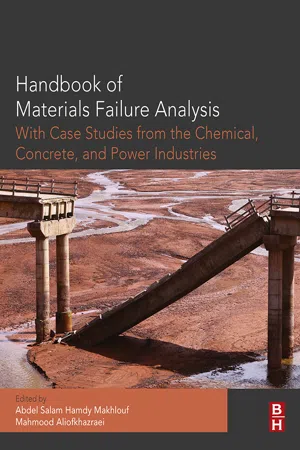
Handbook of Materials Failure Analysis with Case Studies from the Chemicals, Concrete and Power Industries
- 470 pages
- English
- ePUB (mobile friendly)
- Available on iOS & Android
Handbook of Materials Failure Analysis with Case Studies from the Chemicals, Concrete and Power Industries
About This Book
Handbook of Materials Failure Analysis: With Case Studies from the Chemicals, Concrete and Power Industries provides an in-depth examination of materials failure in specific situations, a vital component in both developing and engineering new solutions.
This handbook covers analysis of materials failure in the chemical, power, and structures arenas, where the failure of a single component can result in devastating consequences and costs.
Material defects, mechanical failure as a result of improper design, corrosion, surface fracture, and other failure mechanisms are described in the context of real world case studies involving steam generators, boiler tubes, gas turbine blades, welded structures, chemical conversion reactors and more. This book is an indispensable reference for engineers and scientists studying the mechanisms of failure in these fields.
- Introduces readers to modern analytical techniques in materials failure analysis
- Combines foundational knowledge with current research on the latest developments and innovations in the field
- Includes many compelling case studies of materials failure in chemical processing plants, concrete structures, and power generation systems
Frequently asked questions
Information
Progressive failures of components in chemical process industry
Case history investigation and root-cause analysis
† Piraeus University of Applied Sciences, Egaleo, Greece
Abstract
1 Overview of Failure Mechanisms

Table of contents
- Cover image
- Title page
- Table of Contents
- Copyright
- Contributors
- Preface
- Chapter 1: Progressive failures of components in chemical process industry: Case history investigation and root-cause analysis
- Chapter 2: Engineering failure analysis in chemical process industries
- Chapter 3: Boiler tube failures: Some case studies
- Chapter 4: Creep damage of high alloyed reformer tubes
- Chapter 5: Failure analysis of reinforced concrete structures subjected to chloride penetration and reinforcements corrosion
- Chapter 6: Nonlinear 3D finite-element modeling for structural failure analysis of concrete sleepers/bearers at an urban turnout diamond
- Chapter 7: WITHDRAWN: Investigation of failure behavior of thin-walled tubular components and development of a procedure for evaluation of their mechanical and fracture properties
- Chapter 8: Seismic risk of RC water storage elevated tanks: Case study
- Chapter 9: Reliability and material failure analysis of water and wastewater systems: Case studies
- Chapter 10: A reliable analysis method for estimating large excavator structural strength
- Chapter 11: The reliability design of mechanical system and its parametric accelerated life testing
- Chapter 12: A nonlocal damage-mechanics-based approach suitable for failure assessment and remaining life estimation of critical industrial components
- Chapter 13: A concise filtergram wear particle atlas and some case studies
- Chapter 14: Fatigue failure analysis of welded structures: An overview and A case study
- Chapter 15: Welding-associated failures in power boilers
- Chapter 16: Degradation of protective PVD coatings
- Chapter 17: Application of pyrolysis-gas chromatography/mass spectrometry (Py-GC/MS) and scanning electron microscopy (SEM) in failure analysis for the identification of organic compounds in chemical, rubber, and automotive industry
- Index